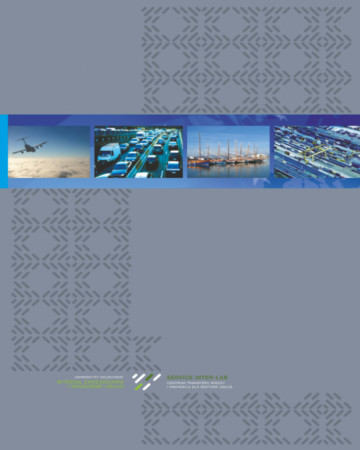
ISSN: 1644-275X
eISSN: 2353-3005
OAI
DOI: 10.18276/ptl.2020.49-02


Lista wydań /
nr 49/2020
Die Bedeutung des Verkehrs für die nachhaltige Entwicklung. Eine Analyse auf Grundlage der Agenda 2030 der vereinten Nationen
| Autorzy: |
Stefan
Schomaker
Hochschule Osnabrück (University of Applied Sciences), Campus Lingen, Institut für Management und Technik, Lingen/Germany |
| Słowa kluczowe: | Sustainable development transport Agenda 2030 sustainable development goals sustainability indicators |
| Data publikacji całości: | 2020 |
| Liczba stron: | 23 (17-39) |
| Klasyfikacja JEL: | Q01 L91 O18 R41 |
Abstrakt
The importance of transport for sustainable development has become significant at the UN conference on Environment and Development in Rio de Janeiro as early as 1992. In the United Nations 2030 Agenda, which contains a total of 17 sustainability goals, sustainable transport has been anchored as a cross-cutting theme. In particular, emissions associated with transport are a problem for the sustainable development goals and have to be reduced. The objective of this paper is to analyze transport-related indicators in relation to sustainable development in the period from 2005 to 2016 at the national level. The method of secondary analysis is used. The results demonstrate only one indicator corresponding to the goal of sustainable development. However, two indicators do not correspond to a sustainable development in the considered period. Thus, appropriate measures have become necessary for these particular facts promoting a sustainable development.
Pobierz plik
Plik artykułu
Bibliografia
| 1. | Arbeitsgemeinschaft Energiebilanzen e.V. (AGEB) (Hrsg.): Auswertungstabellen zur Energiebilanz Deutschland, Daten für die Jahre von 1990 bis 2018, Berlin 2019. |
| 2. | Baur, N./Blasius, J. (Hrsg.): Handbuch Methoden der empirischen Sozialforschung, Wiesbaden 2014. |
| 3. | Bundesministerium für Verkehr und digitale Infrastruktur (BMVI) (Hrsg.) et al.: Erneuerbare Energien im Verkehr, Potenziale und Entwicklungsperspektiven verschiedener erneuerbarer Energieträger und Energieverbrauch der Verkehrsträger, Berlin 2015. |
| 4. | Europäische Union (Hrsg.)/Eurostat: Datenbank, 2019, https://ec.europa.eu/eurostat/de/data/database (2.11.2019). |
| 5. | Eurostat/European Commission - Directorate-General for Mobility and Transport (DG MOVE) (ed.): Durch Verkehrsunfälle getötete Personen, 2019, https://ec.europa.eu/eurostat/tgm/web/table/description.jsp (3.11.2019). |
| 6. | Eurostat/European Commission - Directorate-General for Mobility and Transport (DG MOVE) (ed.): Durch Verkehrsunfälle getötete Personen, Anzahl, 2019, http://ec.europa.eu/eurostat/tgm/table.do?tab=table&init=1&language= de&pcode=sdg_11_40&plugin=1 (3.11.2019). |
| 7. | Eurostat/European Commission - Directorate-General for Mobility and Transport (DG MOVE) (ed.): Durch Verkehrsunfälle getötete Personen, Quote, 2019, https://ec.europa.eu/eurostat/tgm/table.do?tab=table&init=1&language= de&pcode=sdg_11_40&plugin=1 (3.11.2019). |
| 8. | Forschungs-Informations-System (FIS)/Bundesministerium für Verkehr und digitale Infrastruktur (BMVI) (Hrsg.): Motorisierter Individualverkehr, 2017, https://www.forschungsinformationssystem.de/servlet/is/25653/ (5.11.2019). |
| 9. | Keiner, M.: Planungsinstrumente einer nachhaltigen Raumentwicklung, Indikatorenbasiertes Monitoring und Controlling in der Schweiz, Österreich und Deutschland, Innsbrucker geographische Studien Band 35, Innsbruck 2005. |
| 10. | Krebs, D./Menold, N.: Gütekriterien quantitativer Sozialforschung, in: Baur, N./Blasius, J. (Hrsg.): Handbuch Methoden der empirischen Sozialforschung, Wiesbaden 2014. |
| 11. | Partnership on Sustainable, Low Carbon Transport (SLoCaT) (ed.): Sustainable Transport: A Critical Driver to Achieve the Sustainable Development Goals, Shanghai 2019. |
| 12. | Schnell, R./Hill, P. B./Esser, E.: Methoden der empirischen Sozialforschung, 10., überarbeitete Auflage, München 2013. |
| 13. | Statistisches Bundesamt (Hrsg.): Indikatoren der UN-Nachhaltigkeitsziele, Über uns, 2019, https://sustainabledevelopment- germany.github.io/about/ (2.11.2019). |
| 14. | Statistisches Bundesamt (Hrsg.): Statistisches Jahrbuch 2019, Wiesbaden 2019. |
| 15. | Statistisches Bundesamt (Hrsg.): Verkehr im Überblick 2017, Fachserie 8 Reihe 1.2, Wiesbaden 2019. |
| 16. | Statistisches Bundesamt (Hrsg.): Nachhaltige Entwicklung in Deutschland, Indikatorenbericht 2018, Wiesbaden 2018. |
| 17. | Statistisches Bundesamt (Hrsg.): Verkehr im Überblick 2014, Fachserie 8 Reihe 1.2, Wiesbaden 2015. |
| 18. | Umweltbundesamt (UBA) (Hrsg.): Emissionsdaten, 2019, https://www.umweltbundesamt.de/themen/verkehr-laerm/ emissionsdaten#textpart-1 (4.11.2019). |
| 19. | UN (ed.): Sustainable Development Goals, Communications materials, 2019, https://www.un.org/sustainabledevelopment/ news/communications-material/ (2.11.2019). |
| 20. | UN (ed.): Mobilizing Sustainable Transport for Development, Analysis and Policy Recommendations from the United Nations Secretary-General’s High-Level Advisory Group on Sustainable Transport, New York 2016. |
| 21. | UN (ed.): Analysis of the transport relevance of each of the 17 SDGs, Draft, New York 2015. |
| 22. | UN (ed.): Role of transport and transit corridors in ensuring international cooperation for sustainable development, A/RES/69/213, New York 2015. |
| 23. | UN (ed.): Transforming our world: the 2030 Agenda for Sustainable Development, A/RES/70/1, New York 2015. UN (ed.): The future we want, A/RES/66/288, New York 2012. |
| 24. | UN (ed.): Report of the World Summit on Sustainable Development, A/CONF.199/20, Johannesburg 2002. |
| 25. | UN (ed.): Programme for the Further Implementation of Agenda 21, A/RES/S-19/2, New York 1997. |
| 26. | UN (ed.): Konferenz der Vereinten Nationen für Umwelt und Entwicklung, Agenda 21, Rio de Janeiro 1992. |
| 27. | UNSC (ed.): Tier Classification for Global SDG Indicators, 26 September 2019, New York 2019. |
| 28. | UNSC (ed.): Provisional Proposed Tiers for Global SDG Indicators, New York 2016. |